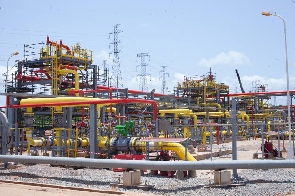The Ghana National Gas Company Limited has successfully completed the scheduled maintenance works of its Gas Processing Plant (GPP) at Atuabo in the Western Region. This maintenance is a key part of Ghana Gas’s core mandate to contribute to the economic development of the country by providing and operating the necessary infrastructure for processing, transporting, and marketing natural gas resources safely, reliably, and cost-effectively within Ghana.
The maintenance work commenced on Thursday, August 1, 2024, and was initially scheduled to conclude on Friday, August 16, 2024. Thanks to the hard work and exceptional efforts of the young Ghana Gas engineers, the maintenance was completed three days ahead of schedule, on Tuesday, August 13, 2024, ensuring that the GPP and offshore gas export facilities remain in excellent condition.
Some of the tasks at the processing plant were handled by the asset integrity and maintenance engineers, while a few others were managed by experienced Ghanaian contractors to ensure the continued functionality of critical equipment across the plant.
The purpose of the maintenance shutdown was to enhance the integrity, reliability, and efficiency of the system while addressing any issues that could compromise safety and performance.
According to oil and gas engineers, planned maintenance is an essential function in maintaining the efficiency of production systems. It helps reduce operating costs and enhances the operational effectiveness of plant facilities, thereby contributing to revenue generation.
Ghana Gas engineers worked tirelessly around the clock to ensure that all facilities operate effectively, fulfilling their core mandate to the people of Ghana and the sub-region. The planned maintenance is a routine activity conducted annually by the young engineers at the gas processing plant to ensure the facilities remain in optimal condition and stand the test of time.
Additionally, the maintenance activities addressed identified defects and provided necessary replacements based on the equipment’s manufacturing lifespan. General Manager of Operations, Robert Lartey, emphasized that while no system is perfect, the board, management, engineers, and staff of Ghana Gas strive to minimize damage costs to all their equipment.
“Some maintenance activities are unplanned since there are no perfect systems, but we work to prevent serious damage to our facilities,” he noted. “It’s good to appreciate the kind of maintenance we do at Ghana National Gas Company to our facilities. There is what we call preventive maintenance, then usually, well-planned and regulated time frame and we do it in such that, it is well programmed.”
This year’s maintenance at the Gas Processing Plant (GPP) involved six types of maintenance work:
1. Preventive Maintenance: Also known as planned maintenance, this involves regular upkeep based on a time schedule. Preventive maintenance considers various factors, including environmental conditions, equipment lifespan, and the company’s objectives. Ghana Gas’s proximity to the sea necessitates particular attention to corrosion control and equipment selection to ensure durability.
2. Predetermined Maintenance: This type of maintenance is based on conditions surrounding the plant’s location. It involves scheduled shutdowns, typically every year or eight months, to conduct necessary maintenance tasks. Some equipment may require monthly or weekly maintenance as specified by the manufacturer.
3. Condition-Based Maintenance: This maintenance is triggered by indications that specific equipment may soon fail, prompting immediate replacement or repairs. It transitions from predetermined to condition-based maintenance when equipment shows signs of imminent breakdown, ensuring that issues are addressed before they lead to failures.
4. Corrective/Reactive Maintenance: This maintenance is conducted to avoid equipment breakdowns. Due to the high cost and time involved in repairing broken equipment, Ghana Gas emphasizes minimizing reactive maintenance. The company ensures standby systems are available to maintain operations during unexpected breakdowns.
5. Predictive Maintenance: Driven by data, this maintenance uses scientific analysis to predict equipment failures before they occur. Ghana Gas’s asset integrity and maintenance engineers inspect facilities annually, using data to inform maintenance decisions and minimize reactive maintenance.
6. Plant Optimization: During this year’s maintenance, Ghana Gas also undertook optimization efforts, including installing a new product cooler unit to ensure continuous plant operation without shutdowns. This allows the plant to run efficiently even if the primary product cooler fails.
The comprehensive maintenance work carried out at the GPP included heat medium maintenance, burners and pilot system replacement, replacement of defective low-pressure knockout drum pumps’ mechanical seals, inspection and refurbishment works in the internals of the debutanizer and de-ethanizer towers, calibration and servicing of all pressure safety valves, transmitters, and gauges, replacement of defective valves, inspection and corrosion control works on the flare stack, chemical cleaning of the heat exchangers, assembly and tie-in work for a new standby product cooler, AMCS after cooler tube bundles inspection and cleaning, AMCS mainline compressor and engine servicing, among others. The installation of a new product cooler as part of the optimization process ensures the plant’s continued operation even in the event of equipment failure.
Richmond Alamu, the Asset Integrity and Maintenance Manager, highlighted the extensive preparations made before the shutdown, emphasizing the commitment of Ghana Gas’s management, engineers, and staff to the maintenance process. He reassured Ghanaians that the company has the expertise and resources to handle maintenance activities effectively, ensuring uninterrupted gas flow for power generation.
“Ghanaians shouldn’t worry at all, normally shutdown maintenance activities are supposed to increase productivity of equipment. In the case at the Gas Processing Plant (GPP), the cost might be higher from the surface but in the long run, when you look at the downtime losses and everything, it’s important to maintain them in a safe and cost-effective manner.”
The successful completion of this year’s planned maintenance, under the leadership of CEO Dr. Ben Asante, Robert Lartey, Robert Asmah, Richmond Alamu, and other managers, reinforces Ghana Gas’s commitment to maintaining its facilities and protecting its assets. The company remains dedicated to ensuring the continuous and safe operation of its gas processing facilities, contributing to the economic development of Ghana.
Business News of Wednesday, 4 September 2024
Source: Romeo Oduro, Contributor













